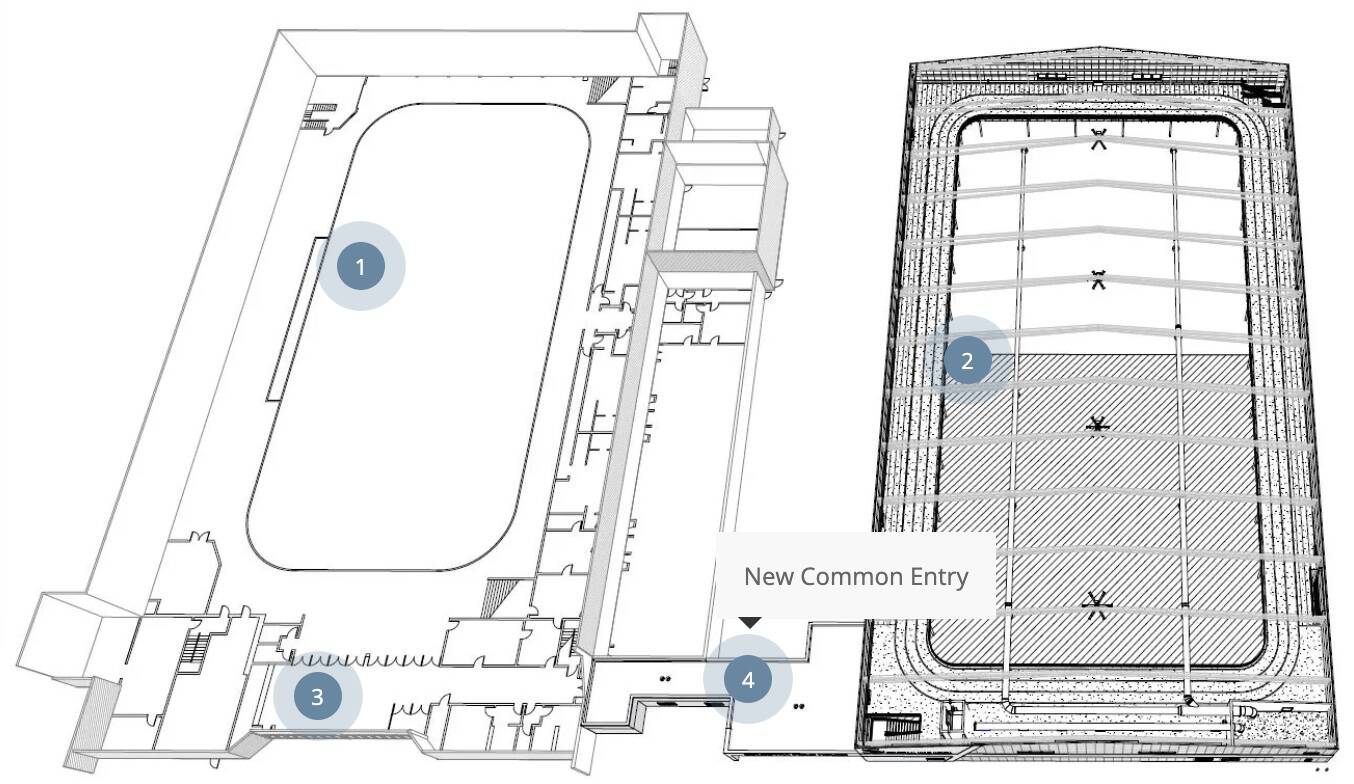Multiple members of the Soldotna City Council are interested in adding a connector building back into the project scope of the Soldotna Field House. The building, which would connect the new field house to the existing Soldotna Regional Sports Complex, was removed from the scope as a cost-savings measure after the city received a higher-than-expected cost estimate for the project.
Council members convened with project leads during a Jan. 24 work session to receive updates on all things field house, from finances to furnishings.
When completed, the 42,000-square-foot Soldotna Field House will sit adjacent to the sports complex and house a multi-purpose sport court, a removable turf field and an elevated walking and jogging track that complies with the Americans with Disabilities Act.
The project has been in the works for almost 10 years and took a major step forward in 2022, when city voters gave the city permission to incur $15 million worth general obligation bond debt to pay for the project. City officials gathered at the project site in October for a ribbon-cutting ceremony to celebrate breaking ground on the project.
Project leads told council members during the work session that the total project construction cost is currently estimated to be $17.3 million. That includes an approximately $14.1 million contract with Criterion General Inc., which the city awarded last September and funds site work, the building, basic flooring and parking improvements and expansion.
The $17.3 million price tag also includes $635,000 for final design and construction administration, $700,000 for construction contingencies and $100,000 for utility relocation. It also covers $1.3 million worth of furniture, furnishings and equipment, such as athletic equipment, the removable turf and sport court, bleachers and the facility reader board.
To pay for a $17.3 million facility, the city will use:
$13.5 million in general obligation bonds;
$970,000 in leftover federal COVID-19 relief funds received through the American Rescue Plan Act;
A $450,000 grant from the Rasmuson Foundation;
$750,000 worth of interest earnings on the general obligation bond.
Those amounts are in addition to $1 million that U.S. Rep. Mary Peltola has secured in the federal budget, although Congress has not yet approved that budget. When that money would end up in Soldotna’s coffers if the federal budget is approved as-is is also unclear, the city said.
Whatever project costs remain will be paid for with money from Soldotna’s general fund.
Council members during their Jan. 24 work session questioned why the city wouldn’t use additional bond revenue to cover the remaining costs. Soldotna voters in 2022 authorized the city of incur up to $15 million worth of bond debt for the project, but the city only plans to use $13.5 million.
Soldotna Finance Director Melanie Imholte said the city has debated internally how much to bond, noting that there are pros and cons to bonding.
“I think we do want to be careful about not over-bonding, because we don’t want to issue too much in bonds and then be trying to figure out what were going to spend those on,” she said.
Multiple council members during the January work session said they want to see the connector building added back into the project scope.
After a mid-2023 price estimate for the project was around $28 million — roughly $10 million over budget, the city eliminated from the project scope a connector building linking the new field house to the existing sports complex. The city also scaled back some of the facility’s audio and visual elements and downgraded and decreased the flooring material to be used, among other things.
“Like other council members here have mentioned tonight, I’m also a very strong advocate of seeing the connector restored,” council member Jordan Chilson said. “That’s a top priority for me.”
C.O. Rudstrom, a project manager for the city, said the project configuration is such that the connector building could be added back without disruption to the existing structure.
“The building as designed leaves appropriate spacing for it and even includes the water and sewer lines (that) are going to be buried underneath where the connector goes,” Rudstrom said.
Project leads estimate the connector building will cost $2.7 million and say the city should construct it later. Soldotna Public Works Director Kyle Kornelis said it would be inefficient for the city to construct the connector building before finishing planned expansion of the sports complex’s existing conference rooms.
“That’s the other reason why it lends itself to postponing the connection piece and strategically attacking that at a later time, in addition to just the impact to the general fund and the operating deficit that we’re looking at up here too,” Kornelis said.
Once the field house is up and running, the city estimates it will cost $590,000 annually to operate. Those annual expenses include salaries and benefits for the new city employees needed to run the facility, as well as ongoing maintenance and operations.
Soldotna City Manager Janette Bower said the city is conservatively estimating that the field house will bring in $150,000 worth of new revenue annually through facility rentals and classes, leaving a yearly difference of $440,000. The city must also pay service on the bond debt it’s incurred through the project, estimated to cost about $790,000 per year.
Rudstrom emphasized that, even though it might not look like any construction is going on at the project site, elements of the project are advancing. Criterion, he said, has already started clearing trees on the property and will start digging for utility lines once the ground thaws. The city estimates that the field house will open to the public in winter 2025.
“There’s a whole bunch of stuff happening right now,” Rudstrom said. “You can’t see it, but, yes, there is work going on.”
More information about the Soldotna Field House can be found on the project website at soldotnafieldhouse.org. The Soldotna City Council’s Jan. 24 work session can be streamed on the city’s YouTube channel.
Reach reporter Ashlyn O’Hara at ashlyn.ohara@peninsulaclarion.com.

